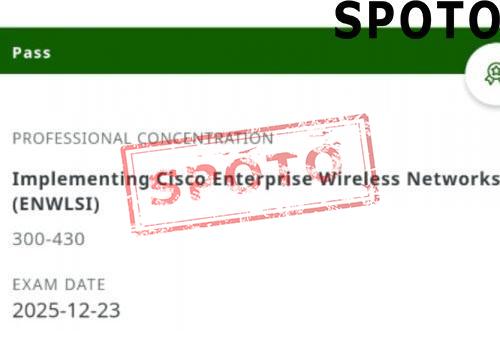
The IT landscape continues to evolve, with networks at the core of modern operations. As businesses demand highly skilled professionals to manage and secure their infrastructures, the Cisco Certified Network Professional (CCNP) certification has solidified its place as a vital career milestone. In 2026 and beyond, earning a CCNP can not only future-proof your career but also open doors to high-impact roles. Let's explore the significance of this certification and how it can shape your professional journey.
Why CCNP Remains Relevant in 2026
1. Industry-Wide Recognition
CCNP certification serves as a global benchmark for networking expertise. Holding this credential demonstrates your ability to:
- Design and implement complex networks.
- Troubleshoot efficiently.
- Maintain scalable infrastructures in enterprise environments.
For employers, it's a trusted indicator of competence and reliability, distinguishing certified candidates from the competition.
2. Staying Ahead of the Tech Curve
With rapid advancements in technology, the CCNP curriculum reflects emerging trends such as:
- Network automation and programmability.
- Cloud-native networking.
- Software-defined networking (SDN).
By earning this certification, you ensure your skills remain relevant as the industry embraces innovation.
3. Adaptability Across Industries
Networking expertise is universally required across sectors like healthcare, finance, and education. CCNP-certified professionals are equipped to handle diverse environments, giving them unparalleled flexibility in their career choices.
CCNP: The Competitive Edge for IT Professionals
1. Broader Job Prospects
Whether you aspire to become a Network Engineer, Systems Architect, or IT Manager, CCNP is the ticket to accessing high-paying and impactful roles. It also sets the stage for leadership positions, as it demonstrates strategic thinking and technical mastery.
2. Financial Rewards
Certified professionals consistently earn higher salaries than their uncertified peers. The CCNP credential signals a commitment to excellence, justifying better compensation packages from employers.
3. Specialization Opportunities
CCNP offers distinct tracks, such as Enterprise, Data Center, and Security, allowing you to tailor your expertise to match your interests and career goals. Specialization adds depth to your skills, making you invaluable to organizations seeking niche expertise.
Steps to CCNP Success
1. Understand the Certification Path
The CCNP certification requires passing two exams:
- A core exam that tests fundamental knowledge.
- A concentration exam focused on a specific domain.
For example, in the CCNP Security track, candidates complete the core SCOR (350-701) exam and a concentration exam such as SVPN (300-730) for VPN implementation.
2. Practice in Real-World Scenarios
CCNP emphasizes practical expertise. Tools like Cisco Packet Tracer, GNS3, or SPOTO labs can help simulate real-world configurations and troubleshooting.
3. Use High-Quality Study Resources
Invest in reliable materials like:
- Cisco Press books.
- Video training platforms like SPOTO.
- Study groups and online forums for peer collaboration.
4. Plan a Structured Study Schedule
Given the depth of CCNP topics, consistent effort is key. Dedicate time daily to understanding theoretical concepts, practicing configurations, and taking mock exams.
Why CCNP Matters More Than Ever
1. Network Automation Is Here to Stay
The rise of automation tools like Python scripting and Cisco DNA Center has reshaped networking. CCNP-certified professionals are trained to integrate these technologies, ensuring efficiency and scalability in operations.
2. Cybersecurity Is a Priority
With increasing cyber threats, CCNP tracks like Security equip professionals with the skills to secure networks against sophisticated attacks.
3. Cloud Dominance
As businesses migrate to the cloud, CCNP certification ensures you can handle hybrid environments, a skill highly sought after in modern IT.
Challenges of CCNP and How to Overcome Them
1. Depth of Knowledge Required
The CCNP exams are challenging, requiring a solid grasp of theory and practical skills.
Solution: Break your study into manageable sections and focus on understanding concepts rather than rote memorization.
2. Balancing Work and Study
For working professionals, finding time to prepare can be difficult.
Solution: Create a study schedule that aligns with your daily commitments and make use of weekends for intensive practice.
3. Hands-On Practice
Some candidates struggle with the practical aspects of CCNP.
Solution: Leverage virtual labs to build confidence and gain real-world experience.
Conclusion
The CCNP certification remains a cornerstone for IT professionals aiming to thrive in the competitive world of networking. With its emphasis on advanced skills, emerging technologies, and practical expertise, it provides a clear path to career advancement in 2026 and beyond.
Whether you're looking to specialize, earn a higher salary, or step into leadership roles, CCNP is a powerful credential that can help you achieve your goals. Start your journey today and unlock the countless opportunities this certification brings.










